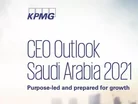KPMG: Saudi CEOs find ESG agendas improve financial results

The majority of CEOs in Saudi Arabia are positive about integrating environmental, social and governance (ESG) practices into their business strategies for sustainable growth, as their risk profile shifts towards disruptive technology and environmental concerns.
That’s according to KPMG’s annual CEO report, a global survey of 1,325 CEOs including 50 in Saudi Arabia.
Research from the KPMG CEO Outlook Saudi Arabia 2021 found that when it comes to climate considerations, 42% of CEOs are intending to invest more than 10% of their revenues in becoming more sustainable.
Both the record fall in emissions following the lockdowns and stakeholder pressure have proven to be a turning point for investors and consumers to demand greater sustainability from companies.
“We notice that CEOs are putting ESG at the centre of their organisation’s long-term growth strategies," says Abdullah Al Fozan, chairman of KPMG in Saudi Arabia, proving that “they can be the drivers of positive change”.
And a survey from earlier this year backs this up. According to Masdar survey, which polled 525 executives leading businesses with more than US$250m in revenues, the majority consider ESG a core objective following the pandemic.
Social component of ESG programmes central for Saudi CEOs
However, it is the social side of ESG that is a growing focus for many leaders in the Kingdom.
With stakeholder pressure increasing to deliver on ESG goals and to actively address societal issues, especially in light of the pandemic, CEOs are putting people first to drive societal return. In response to the effects of the pandemic, some 92% of Saudi CEOs say they have shifted their focus to the social component of their ESG programmes.
And most feel confident about meeting diversity and inclusion expectations, with just 30% of CEOs in the Kingdom believing they may struggle to achieve them, compared to a significantly larger proportion (56%) globally.
Alinma Bank is a case in point. Not only is the bank playing a leading role in financing renewable energy projects, and working on revamping its branches network to reduce its carbon footprint, but part of its strategy “concentrates on the youth segment, encouraging financial education and inclusion” while also focusing on “female empowerment by hiring women in senior positions and increasing the percentage of female employees”, says Abdullah Al-Khalifa, CEO.
And with the launch of the United Nations Global Compact network in the Kingdom in September 2021, which saw Saudi join 69 other networks globally, Saudi CEOs will be further encouraged to develop robust ESG programmes.
Connecting ESG strategy with financial returns
This increased strive for positive change in the Kingdom is in part due to the fact that business leaders are now seeing economic success from their ESG agendas.
Six in 10 CEOs found their ESG programmes improve financial performance, finds KPMG. "It’s encouraging to see business leaders successfully tie their organisation’s economic success to their ESG agendas,” adds Al Fozan.
According to Dina Alnahdy, CEO of Environmental Technology Co., organisations can see real financial benefits when they commit to a full buy-in of ESG. “When an organisation adjusts their strategy, business model and action plans to align with their ESG principles, we estimate that within 5-7 years, revenues can grow up to 6%, and by using circular economy methods, new revenue streams can be created and operational costs can be decreased by up to 8% - bearing in mind the upfront investments in restructuring and digital enablers.”
Disclosure guidelines set to help Saudi firms improve ESG profiles
And to help organisations across Saudi Arabia achieve this, in October 2021, The Saudi Exchange issued ESG disclosure guidelines.
Created by the Saudi Exchange as a way to highlight the importance of ESG and the opportunities it presents for all market participants and stakeholders, the guidelines were designed to help listed companies or those looking to go public report on their sustainable practices.
"With ESG becoming an increasingly critical part of decision-making for local and international investors, these guidelines will encourage companies to voluntarily disclose their ESG performance,” says Mohammed Al-Rumaih, chief executive of Saudi Exchange.
“The disclosure guidelines will help to build awareness of ESG, equip listed companies to better navigate the ever-changing ESG landscape, introduce a selection of reporting options companies can follow to measure their progress, and ultimately unlock the benefits from a sustainable approach to corporate growth.”



